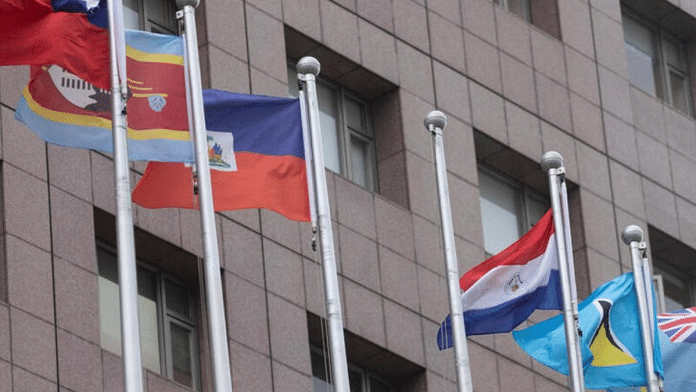New Delhi: The Republic of Nauru Monday announced that it will sever ties with Taiwan, in what is being seen as yet another flip-flop by a country that has a history of recognising and de-recognising others based on the aid it receives.
The development came less than 48 hours after the conclusion of Taiwanese presidential elections. Nauru, a Pacific island nation of 12,500 people, was one of the few remaining countries to have formal ties with Taiwan.
“The Government of the Republic of Nauru today announces that, in the best interests of the Republic and people of Nauru, we will be moving to the One-China Principle that is in line with UN Resolution 2758 which recognises the People’s Republic of China (PRC) as the sole legal Government representing the whole of China and seeking resumption of full diplomatic relations with the People’s Republic of China (PRC),” the government of Nauru said in a press statement Monday.
Beijing appreciated and welcomed the decision by Nauru, according to media reports.
The Nauruan government added that it would no longer recognise Taiwan as a ‘separate country’ but rather that consider it an ‘inalienable’ part of China’s territory, adding that it will sever diplomatic relations with the self-governing territory.
Nauru, a remote island country located to the northeast of Australia, has roughly 21 sq. km of land. Its economy has a narrow and volatile revenue base, and, according to a staff report published by the International Monetary Fund (IMF) in November 2023, is dependent on imports.
This comes after Lai Ching-te, whom China sees as “separatist”, won Saturday’s Taiwanese election for the ruling Democratic Progressive Party (DPP) and will take office on 20 May.
President-elect Lai has long been considered a troublemaker by Beijing for his pro-independence stance and was elected with little over 40 percent of the total votes cast.
However, his party, the DPP, lost its majority in the Taiwanese Legislative Yuan, finishing second to the opposition Kuomintang (KMT). The DPP won 51 seats out of 113 seats in the unicameral legislature, while the KMT emerged as the biggest party in Taiwan with 52 seats.
No party was able to win a governing majority in the legislature for the first time since 2004.
Also Read: China has changed the equation for India’s neighbours. New Delhi can’t neglect them anymore
Cash for recognition
In 2003, Nauru reportedly switched recognition from Taiwan to China for $130 million, but changed its mind for a better offer in 2005 and re-recognised Taiwan.
Nauru depends on fishing licence fees, residual phosphate processing revenues, and revenue from the Regional Processing Centre (RPC) — a detention and processing facility that is home to asylum seekers sent there by Australia on and off since 2000, which, according to the IMF, is being scaled down — to run its economy.
With such narrow domestic revenue sources, the country has in the past reportedly recognised territories and nations — including Taiwan — in exchange for international aid.
An example of this is Nauru’s reported recognition of the breakaway regions of Abkhazia and South Ossetia in exchange for purportedly $50 million worth of aid from Russia in 2009.
Abkhazia and South Ossetia are two breakaway regions from Georgia. In 2008, a short war between the combined forces of Abkhazia, South Ossetia, and Russia expelled Georgian forces from the regions. However, the breakaway territories are considered to be Georgian territory by most of the world.
The only countries that recognise the breakaway territories are Russia, Nicaragua, Venezuela, Syria, and Nauru. The recognition of these territories could potentially cut US funding to the countries that recognise these territories. According to an appropriations bill passed in 2017, its funds cannot be used to support “the Russian occupation of the Georgian territories of Abkhazia and Tskhinvali Region/South Ossetia” or to assist governments that have recognised these two territories.
‘Blatant attack on democracy’
Taiwan — an independent self-governing territory since at least the 1940s — is claimed by the People’s Republic of China (PRC) as part of China.
Beijing’s position on Taiwan is recognised by a majority of members of the United Nations.
The PRC was established on 1 October, 1949, succeeding the Republic of China (ROC), which had ruled Beijing since 1912. The Kuomintang (KMT) retained control of Taiwan and shifted its administration to the island. The KMT claimed representation as the legitimate government of China at international fora.
However, in 1971, the United Nations recognised the PRC as the “only” legitimate representative of China and expelled the delegation of the ROC from the organisation.
Since then, over 180 countries, including India, the US, and member states of the European Union, have recognised the ‘One China Policy’ and the PRC as the sole legitimate representative government of China.
As a result, only 13 countries recognised Taiwan as an independent country and maintained formal diplomatic ties with its government until Monday. With Nauru now recognising the PRC, the number has fallen to 12.
The remaining countries recognising Taiwan include the Holy See (Vatican), Guatemala, Belize, Haiti, Paraguay, Eswatini, and the Marshall Islands to name a few.
In a hastily arranged news conference Monday, Taiwan’s deputy foreign minister Tien Chung-kwang told reporters that Nauru’s move is equivalent to a “blatant attack on democracy”.
The Ministry of Foreign Affairs of Taiwan, in a statement on X, labelled Nauru’s move a “direct challenge” to the international order and was timed by Beijing in “retaliation” against the election.
(Edited by Uttara Ramaswamy)
Also Read: ‘Nearing breaking point’ — Gen Naravane recalls how India, China were at brink of war in Aug 2020



